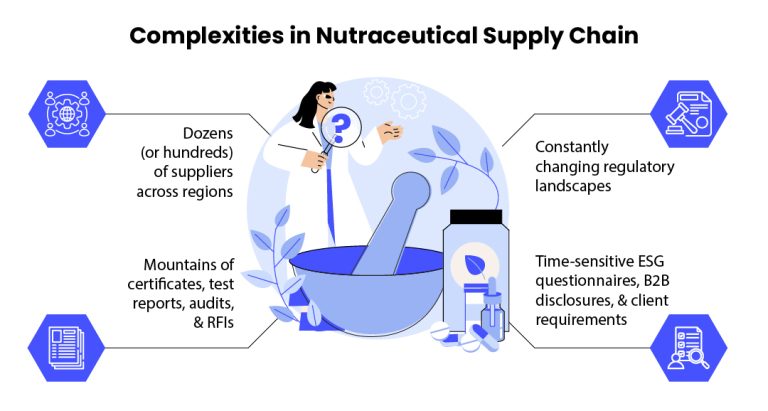If you’re in the nutraceutical space, you already know how challenging it is to manage documentation across complex supply chains. A Certificate of Analysis not sent in time. A supplier’s ESG form left incomplete. A B2B partner growing tired of delays and vague answers. Supply chain traceability in nutraceutical is no less than a maze.
If you work in this industry, you’ve seen it. Maybe you’ve even felt the panic of it. From fragmented supplier data to evolving regulations, the pressure is real.
We all know that supply chain traceability isn’t just a regulatory checkbox anymore. It’s a trust signal, a growth enabler, and in some cases, the only reason a deal goes through. But how do we maintain end-to-end traceability amongst the chaos of scattered data throughout the supply chain? There are solutions. But before we get into it, let’s first understand the complexities.
What’s Broken in Today’s Nutraceutical Supply Chains?
The global nutraceutical industry stood at an estimated USD591.1 billion in 2024 and is growing at CAGR of 7.6%. But for companies scaling fast or entering new markets, the real challenge isn’t sales — it’s supply chain transparency. Why? Because nutraceutical supply chains are a mess. They’re long, global, and loaded with data silos. You’re dealing with:
- Dozens (or hundreds) of suppliers across regions
- Mountains of certificates, test reports, audits, and RFIs
- Constantly changing regulatory landscapes
- Time-sensitive ESG questionnaires, B2B disclosures, and client requirements
And much of this data still lives in PDFs, emails, and spreadsheets.
Most companies don’t even acknowledge how fragile their documentation workflows are until someone asks:
“Can you show me the origin of this ingredient, and provide full documentation from all tiers of your supply chain?”
That’s where things unravel. You open email threads, shuffle through folders with cryptic names like “final-final-2023,” or worse — rely on a colleague who just went on leave. The reality is most traceability systems are still stuck in spreadsheets and siloed folders. But it’s 2025. And this shouldn’t still be happening.

The Real Cost of Poor Supply Chain Traceability
When supply chain traceability fails, it doesn’t just slow things down — it hurts your brand’s reputation. It costs your time, your consumers’ trust and revenue.
In fact, 73% of global consumers say traceability is more important to them now than ever before. That’s not a number you can ignore. Because what’s at stake is not just a document — it’s credibility. And let’s not forget the rising pressure from:
- Regulatory bodies demanding full audit trails
- Retailers and marketplaces asking for ESG disclosures
- Sustainability teams trying to prove impact
- Buyers expecting near-instant answers on ingredient origin, certifications, and compliance
Most brands are still duct-taping this process together. But the ones really scaling their nutraceutical business are using AI to do the grunt work for them.
How AI Is Rebuilding Supply Chain Traceability?
This is where AI isn’t just hype. It’s tangible help. The smartest brands are talking about AI-powered traceability as a real, practical solution to daily headaches.
Let’s say you’re asked to:
- Fill out a 30-point ESG form for a buyer
- Provide audit documents for a 3rd-party inspection
- Complete an RFI before the end of the day
If your documents are buried in inboxes or Google Drive folders, you’re spending hours chasing information, making your brand look disorganized. But with a platform like RightOrigins, your entire supply chain data is structured, digitized, and response-ready. RightOrigins’ AI agents can:
- Centralize all your company documents
- Instantly generate audit-ready data from existing documents
- Auto-fill client questionnaires using structured metadata
- Flag missing or outdated supplier certifications before it becomes a problem
It’s like having an AI assistant whose only job is to make your traceability airtight. And save your team 20+ hours a week. Companies that invest in supply chain traceability see a direct ROI — not just in saved time, but in reduced compliance risks and increased customer trust.
The Future of Supply Chain Traceability
AI has made its mark in almost every industry. It’s high time we embraced AI agents in supply chain traceability as well. With growing complexity, software solutions are not going to be enough to keep track of your nutraceutical supply chain. You need more than just another dashboard or cloud folder. You need AI-powered solutions like RightOrigins.
Platforms like RightOrigins aren’t CRMs for your ingredients. They’re living, breathing traceability systems powered by AI — built for the real, messy world of nutraceutical supply chains. And here’s what happens when you embrace that:
- B2B sales cycles shrink because documentation is ready before they ask
- Compliance teams breathe easy knowing every product has a complete, verifiable trail
- Retail partnerships deepen because your ESG answers aren’t just guesses — they’re backed by real-time data
- And your brand builds reputation, not risk
The Takeaway
Consumers are no longer just buying ingredients — they’re buying stories, transparency, and accountability. And brands that can back their claims with verifiable, auditable data will win.
RightOrigins helps nutraceutical companies do just that. It makes your supply chain efficient, faster, smarter, and without manual chaos. If you’re still managing traceability through scattered spreadsheets, you’re not just behind — you’re at risk. And It’s time to fix that.
